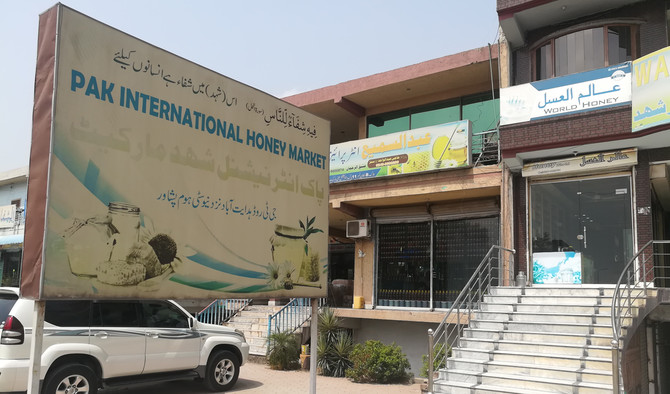PESHAWAR: Peshawar’s Tarnab Farm is home to Pakistan’s biggest honey market, which exports about 4,000 tons of the commodity worth nearly Rs 2.8 billion ($0.023 billion) to Arab countries every year.
Senior Vice President of the All Pakistan Beekeepers Exporters and Honey Traders Association, Sheikh Gul Bacha, told Arab News on Sunday that about 200 containers, each carrying about 20 tons of honey, are exported to various Arab states, mostly to Saudi Arabia.
“We export bair (jujube) honey, which is produced in September and October, to Saudi Arabia and other Arab countries in huge quantities. Most people in that region like the product since it does not solidify. Arabs also use honey more frequently because Islamic teachings emphasize its medicinal properties,” he added.
Hajji Nauroz Khan, a honey trader, claimed that while the Arab countries also imported the commodity from other parts of the world, most of their residents preferred honey produced in Pakistan because of its superior quality and taste.
“The honey produced in this country is pure. Arabs like bair honey, and Pakistan supplies it in its purest form. Other countries produce a mix of bair and other plants,” he said.
Khan also informed that honey produced in Punjab, Azad Kashmir, Sindh and Balochistan was also brought to the Tarnab Farm market for sale.
“Although honey is also produced in other parts of the country, nearly 85 percent of the people associated with this business are Pashtuns.”
He recalled how the Tarnab Farm market was initially set up with the funding of international donor organizations that were working for Afghan refugees who had migrated to Peshawar after the Soviet invasion of their country. Back then, the market could boast only of a few shops. However, the business expanded and there are hundreds of shops in this vicinity now.
Talking to Arab News, Sher Zaman, a honey exporter, said the government should also help honey traders to export their product to Central Asian markets.
“We don’t have a proper market in Central Asia,” he said. “This is despite the fact that our palusa (rosemary) honey can make a huge impact in the region. This variety of honey is usually people’s first choice in cold countries.”
Zaman said there were four main kinds of honey sold in the market: “bair honey, orange honey, palusa honey and clover honey.” The types of honey varied since honeybees gathered nectar from a variety of different plants in different parts of the country.
Assistant Director of the Trade Development Authority, Zahid Khan, told Arab News that his department periodically organizes workshops and exhibitions for the promotion of local products. “We are not responsible for regulating the honey business,” he added, “but we facilitate the traders.”
He pointed out that the honey business was owned and operated mostly by Afghans, adding: “The ongoing repatriation of Afghans to their native land has also affected this trade in Pakistan. However, local traders have now taken control of the situation and stabilized the honey business.”
Peshawar’s honey market sweetens the lives of millions in the Arab world
Peshawar’s honey market sweetens the lives of millions in the Arab world

- Every year, the market exports honey worth Rs 2.8 billion to Arab countries
- Exporters claim the honey produced in Pakistan is preferred by people in the Middle East because of its taste and quality
Where We Are Going Today: Tatemat Jastaniah

- Traditionally, tatema includes an array of small dishes such as cheeses, Hijazi mish, flavored olives, cold and spicy pickles, lupini beans, balila, areeka, masoub, mutabbaq and kabab meeroo
If you ever find yourself in Jeddah craving authentic Hijazi flavors, check out Tatemat Jastaniah located in Al-Salamah district.
This cozy store offers a nostalgic culinary journey centered around the traditional Saudi concept of “tatema,” a cultural tradition referring to a light, comforting meal typically enjoyed late in the evening, often shared with bread and small savory dishes.
Today, it remains a cherished ritual, especially in Makkah, Madinah and Jeddah, valued for its simplicity, affordability and deep cultural roots.
The Saudi mezze-style breakfast or supper includes creamy labneh with mint, olives, pickles, spreads and foul. At Tatemat Jastaniah, this humble tradition is elevated with a creative, modern twist.
The shop’s signature breakfast platters are a highlight and it also offers homemade goods such as artisanal marmalades, tahini and herbal teas.
Traditionally, tatema includes an array of small dishes such as cheeses, Hijazi mish, flavored olives, cold and spicy pickles, lupini beans, balila, areeka, masoub, mutabbaq and kabab meeroo.
It is often accompanied by a selection of classic sweets such as laddo, labaniyah, hareesa, semsamiya, tahini halva and homemade jams.
This spot is especially popular during Ramadan when demand for traditional foods and social gatherings peaks.
Some Jeddah locals set up tatema buffets for wedding celebrations, Eid and casual breakfast or dinner spreads.
When you step into the store, the air is filled with the scent of freshly baked bread and the warm buzz of local conversations.
For more information, visit @tatematjastaniah on Instagram.
Where We Are Going Today: ‘Noho Deli’ – New York–style deli sandwiches in Riyadh

- A must-try side is the Beefy Cheese Fries (SR29) — warm, cheesy, and topped with tender beef, they’re as indulgent as they sound
If you’re craving New York–style deli sandwiches in the heart of Riyadh, Noho Deli is your go-to spot. With freshly cooked and sliced meat prepared in-house and a menu that balances comfort and quality, this place has quickly earned a spot among my top favorites in the city.
We tried a variety of sandwiches, and every single one delivered on flavor. The Reuben Pastrami, priced at SR44 ($11.73), had that perfect balance of smoky meat and tangy dressing.
The Grilled Chicken Pesto (SR36) was fresh and herbaceous, while the Noho Roast Beef (SR38) and Mustard Roast Beef (SR3) brought bold, satisfying flavors layered between perfectly toasted bread.
For something lighter, the Mozzarella Sandwich (SR34) was creamy and well-seasoned, and the Okra Kale Salad (SR35) offered a refreshing, earthy break from all the richness.
A must-try side is the Beefy Cheese Fries (SR29) — warm, cheesy, and topped with tender beef, they’re as indulgent as they sound.
The pricing is surprisingly reasonable given the high quality of the ingredients, and the portions are filling without being overwhelming. The branding and dine-in vibe are also on point — stylish yet casual.
One downside, though, is the seating area, which can feel a bit cramped and not ideal for groups or longer stays. It’s more of a grab-and-go or quick-bite kind of place than a spot to linger.
Still, the food speaks for itself, and if you’re in Riyadh and craving deli-style goodness done right, Noho is definitely worth a visit.
For more, check their Instagram @nohodeli.
Where We Are Going Today: ‘Cuz Balcony’ restaurant in Dammam

If you’re looking for a quiet morning with sea breeze and a cozy brunch, Cuz Balcony in Dammam is a charming hidden gem. Located on a sunny rooftop with a panoramic view of the sea, the restaurant offers a warm, homey ambiance that feels more like a family gathering than a commercial space. The staff — especially the owners — are incredibly kind and make you feel instantly welcome.
Their CUZ platter for SR53 ($14.13) is perfect for sharing — a diverse spread of creamy labneh, fresh cheese, flavorful eggplant dip, and other savory sides, served with warm, soft bread.
The lahm b’ajin (SR54) was equally impressive — a freshly baked flatbread topped with spiced minced meat, caramelized onions, arugula, pomegranate seeds, and toasted nuts. The mix of sweet and savory flavors with a crispy crust makes it one of the most memorable dishes on the menu.
The French toast (SR53) was rich and satisfying — soft inside, crispy outside, and lightly sweetened with a smooth cream topping.
The avocado egg (SR54) came layered over warm bread and greens, with balsamic glaze and assorted dips on the side — light, creamy, and balanced.
To drink, the karak (SR14) stood out with its deep flavor and traditional serving in a classic black teapot, while the hot Americano (SR14) was bold and well-brewed.
One downside, however, was that several dishes were already sold out by the time we arrived late morning. With such a focused menu, it would’ve been great to explore more, especially on a first visit. Hopefully, they’ll expand availability as the place continues to grow in popularity.
Still, everything we tried was truly delicious, the staff was exceptionally warm, and the seaside view made it all the more special.
For more information, check their Instagram @cuz_ksa.
Where We Are Going Today: ‘Hashem’ restaurant in Jeddah

Hashem restaurant, established in 1956, is one of Amman’s most iconic gems. It has finally made its way to Saudi Arabia with the first branch open in Jeddah’s Al-Rawdah district, bringing the legendary flavors of Jordanian street food with it.
Whether you want a sunrise breakfast or are on a midnight snack run, their doors are open for you.
The restaurant serves large portions made with fresh ingredients. Their quick service and buzzing energy will make you feel right at home.
Just like in Amman, no menu is needed. Just take a seat and the team will start you off with a full spread of the essentials. You can ask for eggs (fried or boiled), olives and pickles, or their house-made spicy sauce.
I ordered the usual Jordanian breakfast, including the famous creamy hummus topped with minced meat, olive oil and pine nuts, and crispy stuffed falafel.
I also ordered their fatteh and foul. It was warm, seasoned, and went well with fresh bread and special Jordanian spicy sauce made of lemon, chilli and garlic. I also asked for a glass of mint tea to round it all out.
Located in one of Jeddah’s most vibrant neighborhoods, Hashem offers a welcoming, family-friendly atmosphere perfect for both dine-in and takeaway.
Whether you’re a nostalgic Jordanian or a curious first-timer, it’s a great spot for a hearty meal.
Moma’s Garden: A Saudi family’s recipe for love

- Al-Mumen family blends culinary creativity, tradition in cozy Alkhobar restaurant
- Teamwork brings comfort through home-like decor, modern twist on Arabic flavors
ALKHOBAR: In a quiet corner of Alkhobar, Moma’s Garden has become more than just a restaurant — it is a family-run establishment at which hospitality is as important as the food itself. With another branch in Dammam, the restaurant is entirely operated by the Al-Mumen family, whose members take on various roles to run its daily operations.
The atmosphere of Moma’s Garden is intentionally just like home. Sunlight filters through white curtains, casting a warm glow over wooden tables and lush greenery. The walls are adorned with framed family photographs, reflecting a history deeply intertwined with the restaurant’s identity.

Moma’s Garden started as a small venture in a Dammam hotel, a modest space that helped to lay the foundation for what would later become a larger family project.
Abdulfattah Al-Mumen, the father, said: “At first we opened Moma’s Garden in a hotel in Dammam. It was a small place, but it was big in our hearts, and that’s where our story began. Now, with our second branch in Alkhobar, our journey continues.
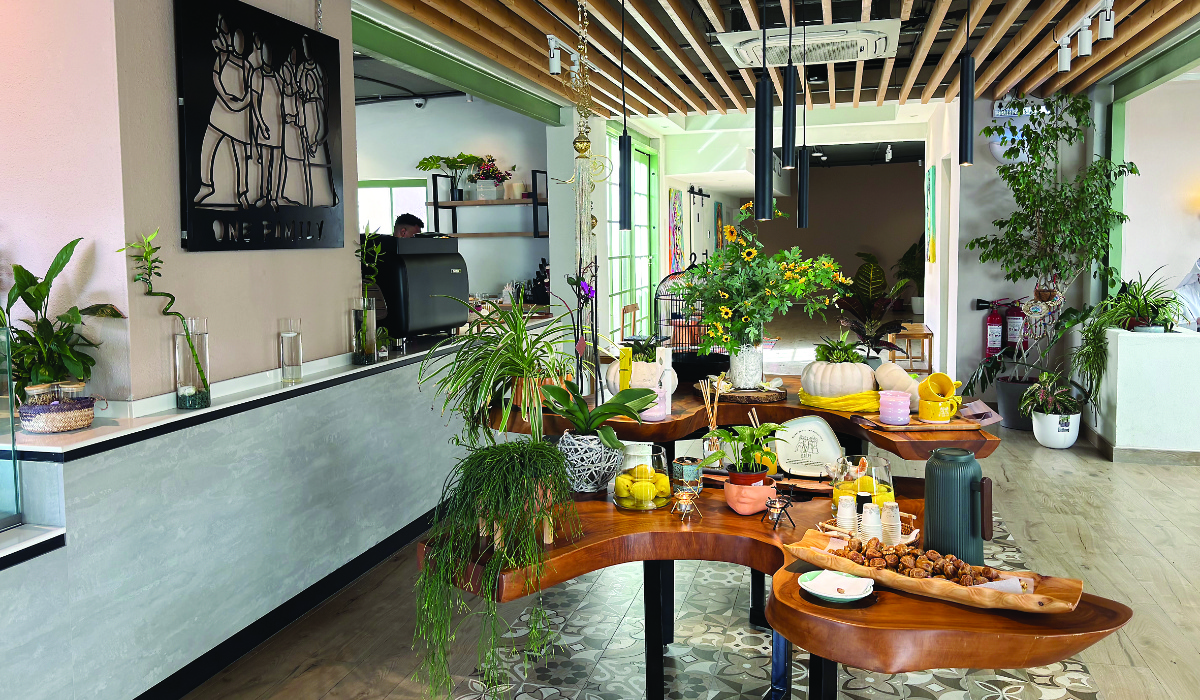
“It is built on the passion of our family, my wife’s creativity, and our children’s experiences from traveling and living abroad. They learned to cook for their friends, and today they are capable of managing businesses, finances, architecture, and law.”
And while each member of the family brings something to the table, Al-Mumen said: “The mastermind behind all the creativity is my wife. In the end we are simply a family that enjoys cooking and being together.”
We are not just running a business. We are sharing our passion, our creativity, and our love for food. At the end of the day what matters most is that we continue to do what we love together.
Abdulfattah Al-Mumen
Abdulhadi, their young son, told Arab News: “I handle the front desk, my mother oversees the menu and its development, Hassan manages finances, and Bayan handles legal matters.”
However, the roles are not set in stone and each family member steps up as needed. Abdulhadi added: “My father and I collaborate on architectural and design aspects … Sometimes my father is a waiter and sometimes I cook in the kitchen. We all share responsibilities.”
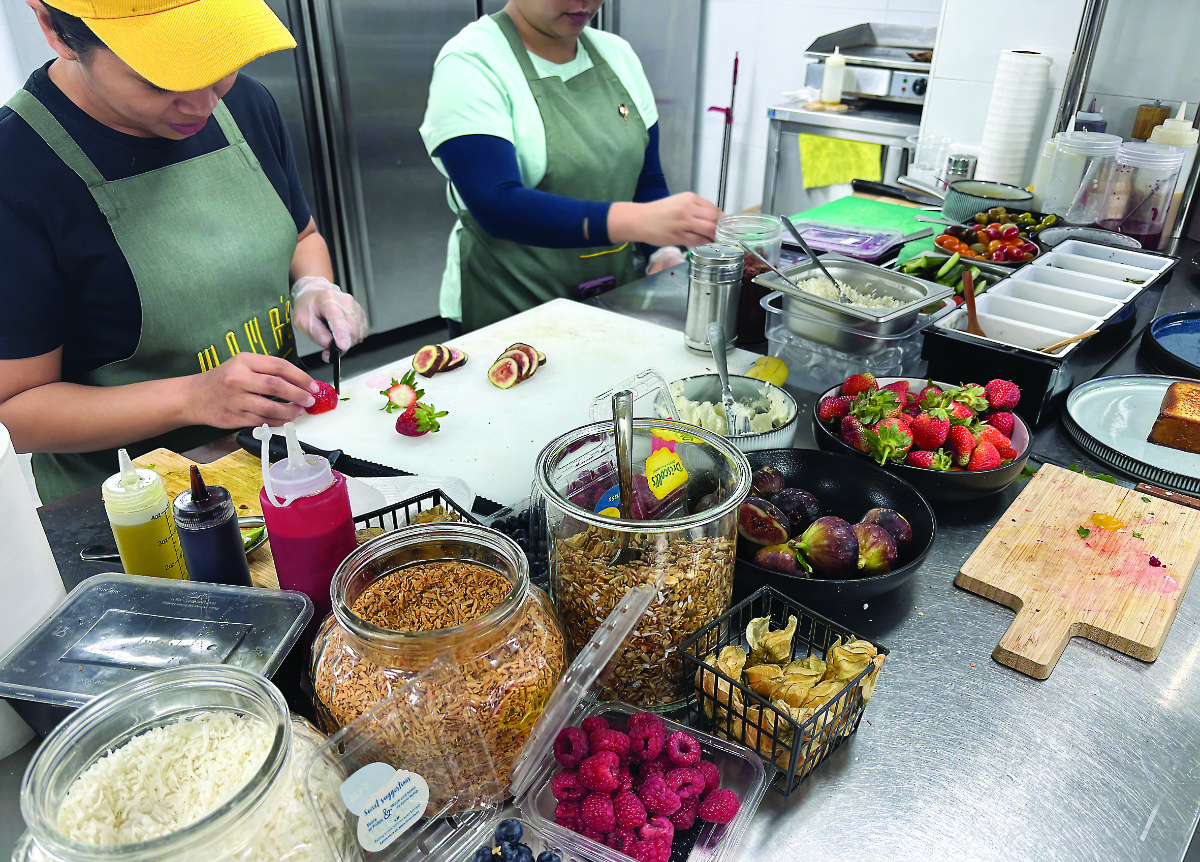
At the heart of Moma’s Garden is Intessar, the matriarch who personally oversees the menu and ingredient selection, ensuring that every dish meets her high standards.
She said: “Finding the right ingredients can be difficult. Every day I go out myself and handpick what we use. Maybe that’s why this place feels like home to so many people. Even the local vendors recognize me now and know I won’t settle for anything less than top quality.
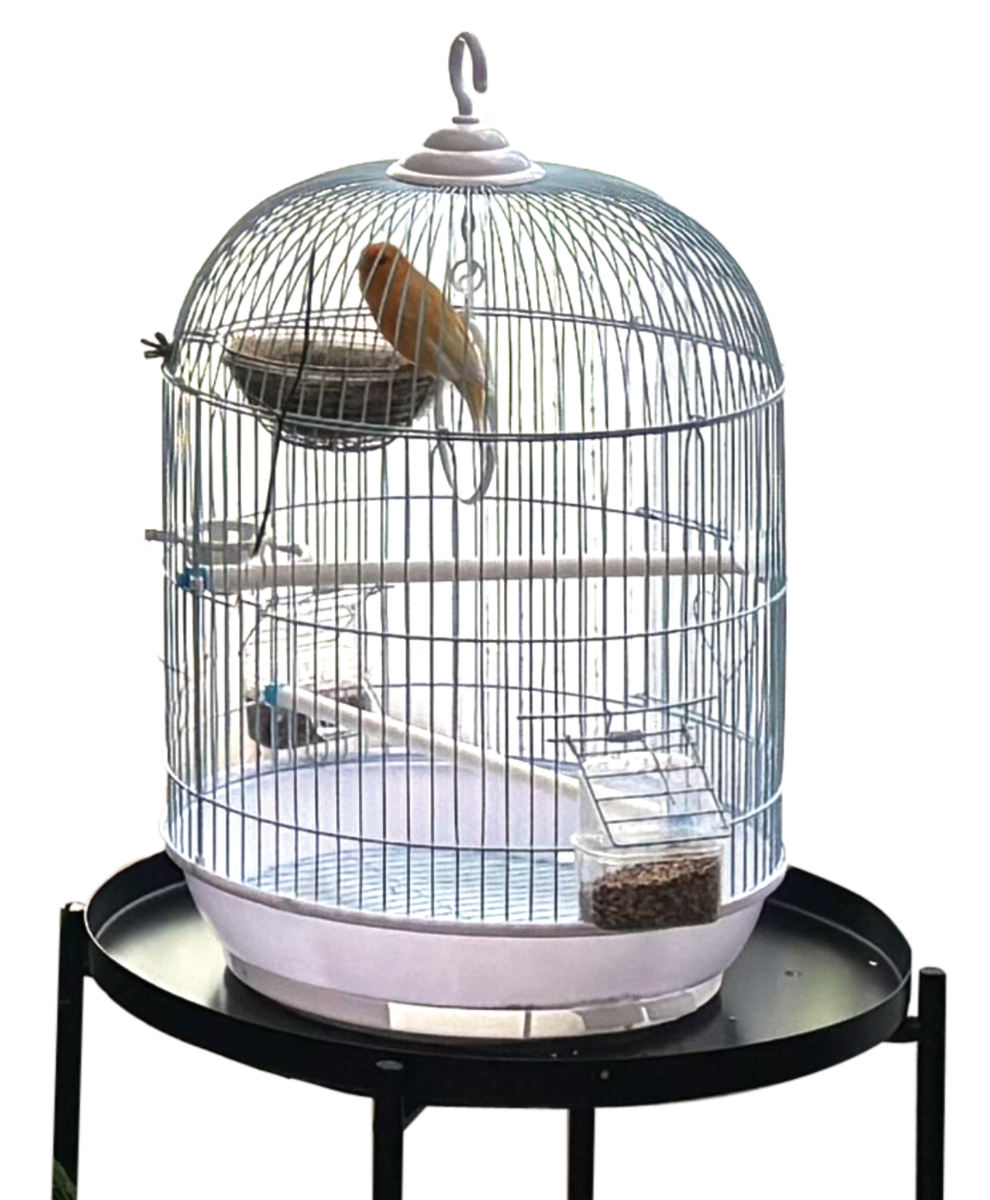
“Our dishes are not traditionally Arabic, but we’ve given them a modern twist infused with Arabic elements, like shakshuka and date toast.”
This hands-on approach and commitment to fresh ingredients help define Moma’s Garden’s philosophy.
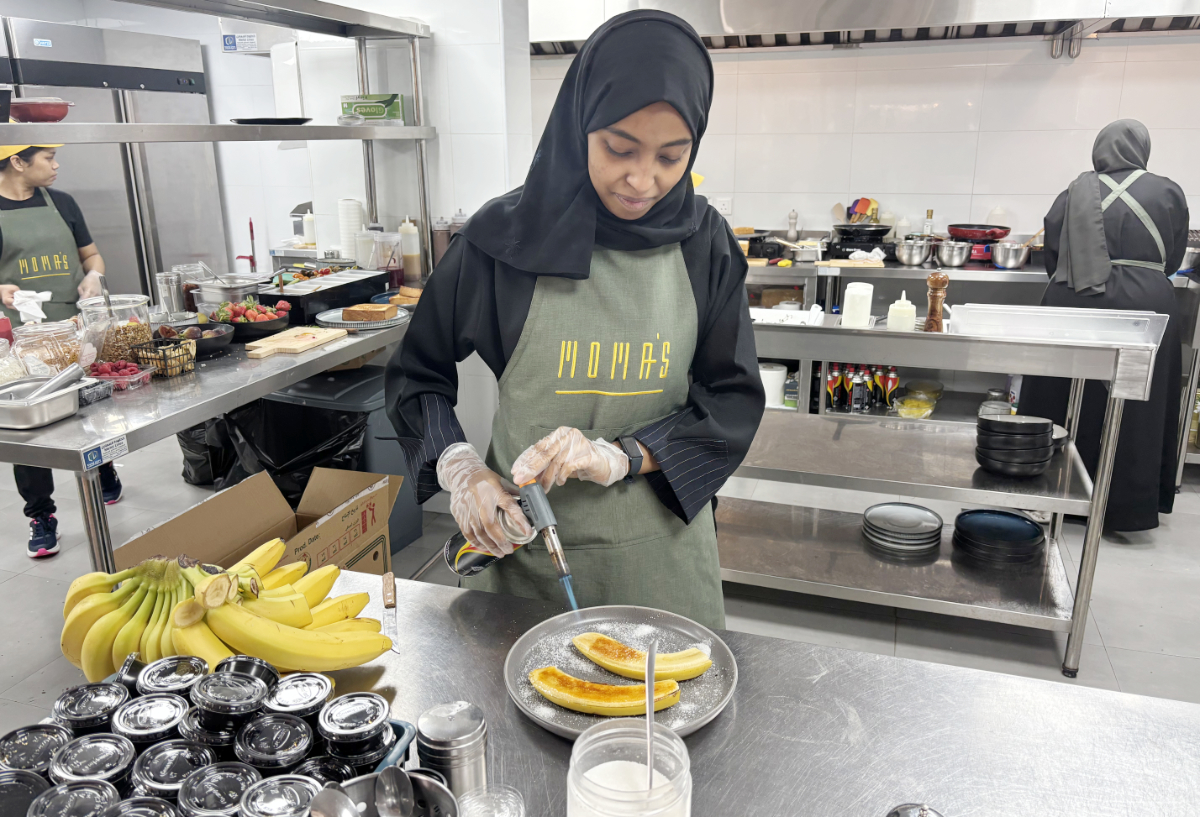
The setting at Moma’s Garden is carefully designed to create a welcoming and relaxed environment. The wooden tables, soft pastel hues, and an abundance of plants contribute to an atmosphere that encourages guests to unwind and enjoy their meal.
A unique feature is the wishing tree, where visitors leave handwritten notes — a symbol of community and connection that has become an integral part of the restaurant’s charm.
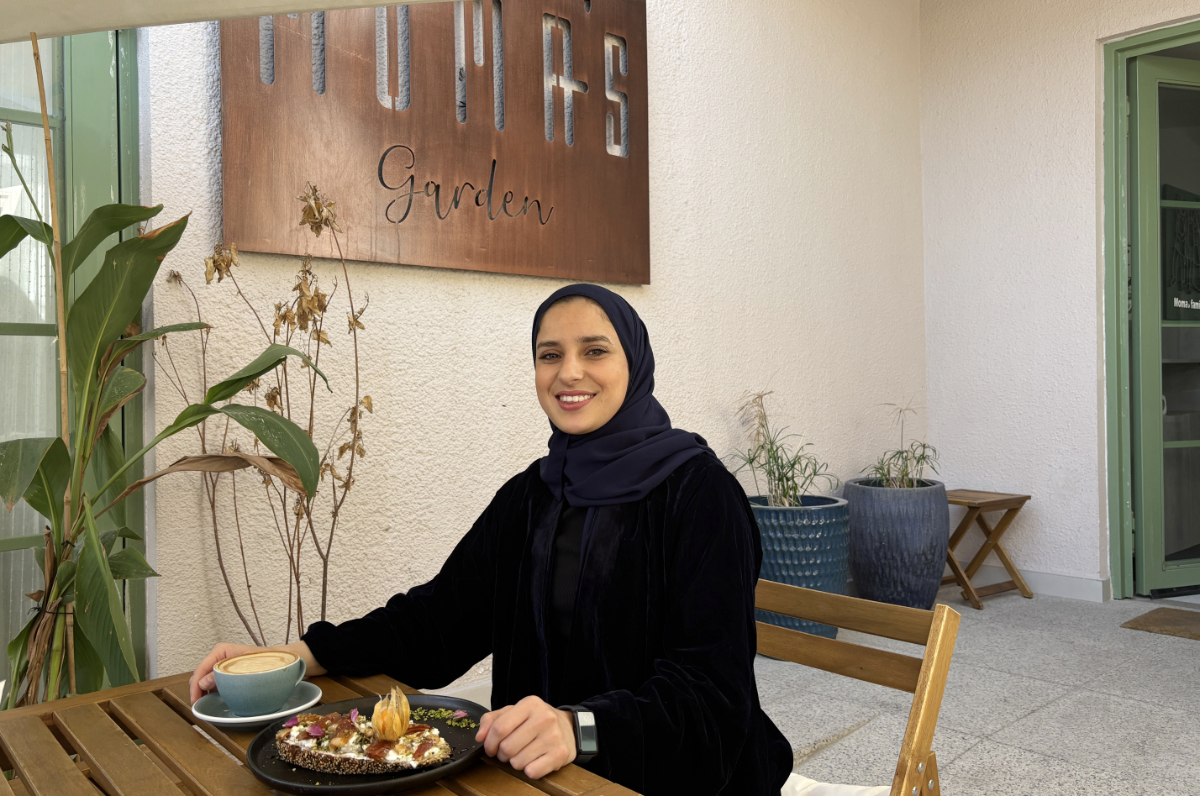
Al-Mumen said: “We select our ingredients as if we are choosing them for our own home, so that our guests feel like they are in their second home, not just any restaurant.
“We want them to feel like they are visiting us, like guests in our own house.”
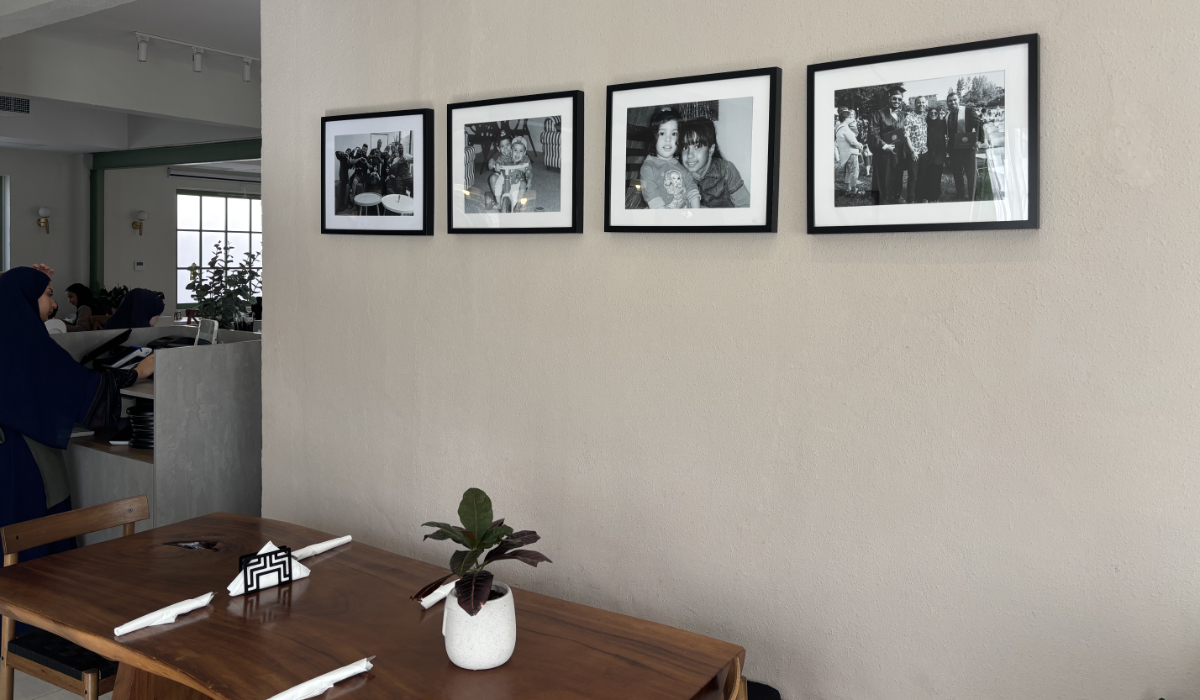
For many customers, this sense of familiarity is what keeps them coming back.
Roa Khushina, a fitness trainer and regular at the establishment, said: “I always come to Moma’s Garden — it’s honestly one of the best restaurants in Alkhobar. Their dishes are excellent, diverse, and they even offer healthy options.”
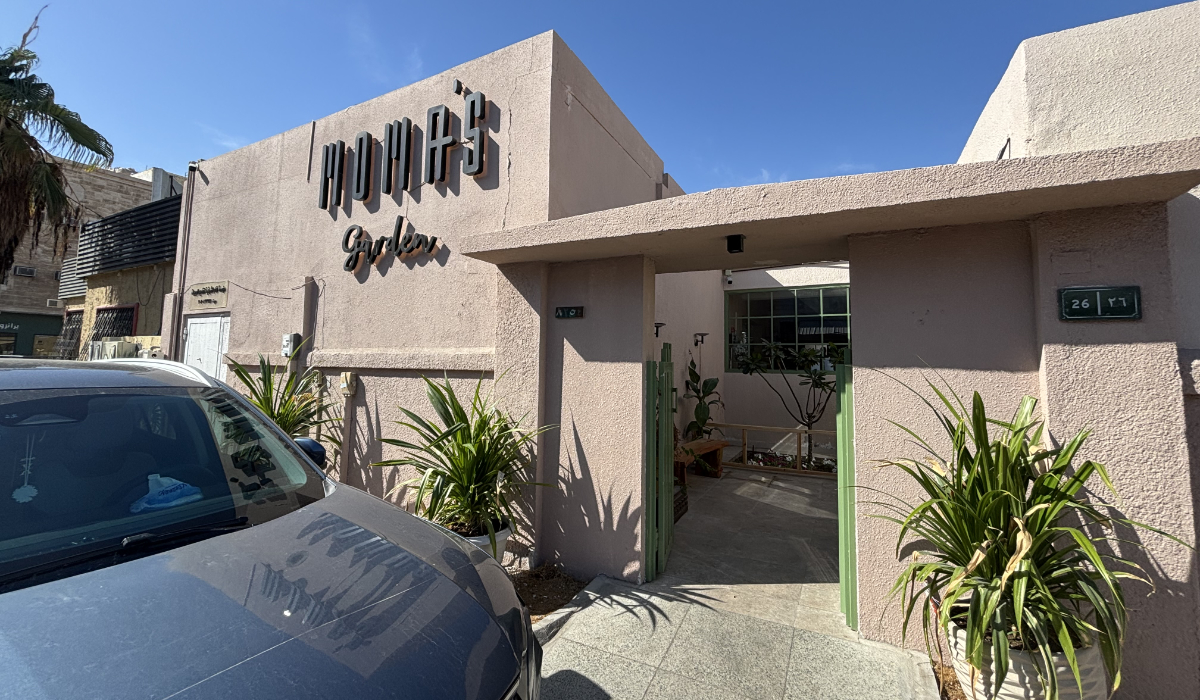
Running a restaurant as a family comes with its own challenges, particularly in hiring staff who align with the restaurant’s vision.
Hassan, the eldest son, said: “We don’t just look for employees — we look for people who fit our culture, who see this place as more than just a job. It takes us four to five months to find the right person.”
Despite occasional differences in opinion, the Al-Mumen family views these challenges as an essential part of working together and evolving the business.
“These challenges make our family stronger, and we see ourselves as partners in success,” he added.
With two established locations, the family remains committed to maintaining quality rather than expanding too quickly.
“We are not just running a business,” said Al-Mumen. “We are sharing our passion, our creativity, and our love for food. At the end of the day what matters most is that we continue to do what we love together.”
For many visitors Moma’s Garden is not just a restaurant but a place shaped by personal stories, dedication, and a deep appreciation for hospitality.


